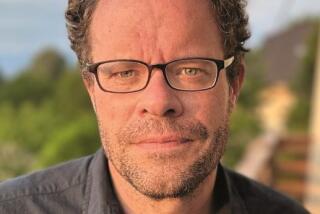From illiterate to role model
- Share via
The metamorphosis is as quick as the turn of a page: John Zickefoose is a hyperactive goose, a laid-back bear, a monkey, a tiger. The children at the Corona Public Library squeal with laughter as the man whose name rhymes with Seuss becomes louder and more animated.
There was a time when reading the simple words of a picture book would have proved impossible for Zickefoose. He spent years in school overwhelmed with sadness that nothing came as easily to him as it did for others. He would become rowdy, preferring to be kicked out of class than to be called on by the teacher.
Zickefoose was functionally illiterate, unable to read a prescription label, his children’s report cards or a menu. He was diagnosed as a young boy with dyslexia and attention deficit hyperactivity disorder and didn’t learn to read and write until he was 35.
That’s when everything changed. He became a poster boy for the Corona library’s adult reading program, began to speak publicly about his own struggles and was named the library’s literacy director. He founded a nonprofit youth organization.
And on Dec. 7, Zickefoose, 52, was sworn in as a member of the Corona-Norco Unified School District Board of Education.
For the boy who couldn’t understand the words on his high school diploma, the journey to the school board was the culmination of a vow to do something meaningful in life and help prevent others from starting out as he did.
“I’ll be able to bring, quite frankly, an unusual perspective of what it feels like to be in the classroom and be a failure,” Zickefoose said. “I don’t want any child to go through what I went through.”
--
For years, even his wife wasn’t aware of the severity of his limitations.
He would wish there was a magic pill he could take to make his disabilities disappear. The lowest point, he said, came when he couldn’t understand his 7- year-old’s homework assignments. When Shawn asked for help, Zickefoose sat with him at the kitchen table. But when Zickefoose looked at the textbook, all he saw were letters strung together that made no sense.
When he tried to fake his way through a bedtime story, his son would tell him, “No, Dad, that’s not what it says.” The little boy had no idea he was making him feel that he was failing as a father.
It was then that Zickefoose resolved to enroll in an adult literacy class at the Corona library. He was embarrassed and angry at himself. He had always been able to hide his illiteracy and wriggle out of uncomfortable situations. Now he believed there was no other option.
It didn’t go well at first. Zickefoose insisted on starting with more complicated sentences and words than he was ready for, out of embarrassment. He wanted to cancel on his first day. This is stupid, he thought. He was incapable of learning.
But his tutor persuaded him to start with the basic building blocks of reading and writing. The one-on-one interaction was just what he needed.
Within six months, he was reading novels and nonfiction.
An estimated 30 million American adults can’t read a newspaper or fill out a job application. Many have learning disabilities. Others are dropouts, victims of failing school systems. Some are immigrants with deficient English language skills who may also be illiterate in their native tongues.
But Zickefoose is also an anomaly. Only about 5% of adults who need services receive them, mainly because there is still so much shame attached to the condition, said David C. Harvey, president and chief executive of ProLiteracy, an international advocacy group. Zickefoose serves on the board of directors.
“John is a national role model because one of the most effective ways to break down that stigma is to have people who have had this problem talk about it,” Harvey said. “He’s a shining example of what can happen when someone gets services and puts those new skills to work.”
--
Zickefoose was brought up in the Chicago suburb of Elmhurst, and his father and stepmother tried hard to help him. He blamed himself for his failures, not his teachers, whom he says were supportive and wanted him to succeed.
He went to specialists in Chicago who identified his problems in school but couldn’t provide a solution.
“They have come so much further now in dealing with learning disabilities in a more efficient and productive manner,” Zickefoose said. “ Back then, they were good at diagnosing but they didn’t have the tools to address it.”
Once, in the fifth grade, he raised his hand to answer a question and was devastated when he got the answer wrong and a friend answered it correctly. Looking at a sign, a book or a newspaper was like being in a foreign country, confronted with a totally alien language, he said. Without the code, he couldn’t master math or science or any other subject.
Still, he managed to scrape by with Ds and to graduate. Most states, in the late 1970s, did not require students to pass math and English tests to receive a diploma.
He got his driver’s license in Illinois after taking the written part orally. He memorized such symbols as street signs and he had friends fill out job applications.
At 19, he bought a station wagon and moved to California, where his mother lived. He drove a truck for several years and then got a job restoring houses. He met Eileen, the woman who would become his wife. He managed to start his own restoration business, but that failed after a few years and he went to work for another company.
Eileen noticed that he always had a large wad of cash, not checks. He didn’t have a bank account. “That would have taken skills to manage,” she said recently.
--
He didn’t think she really understood how serious his problems were. She thought he just didn’t want to bother with paperwork or the bills. It was the only source of tension in their relationship. Once, Zickefoose tried to make her understand that he really couldn’t read. “You don’t get it, I can’t do it,” he told her.
Even now, she said, it’s hard for her to believe his reading ability was so limited.
“He just seemed to do fine,” she said. “He learned to compensate. If we went to a restaurant, he [already] knew what to order off a menu or he could tell by the pictures. When he couldn’t, he would just order a hamburger.”
“I was pretty good at faking it,” Zickefoose said, “and it shows the depths of it that even with the woman I loved and cherished, I still felt I couldn’t tell her.”
During that time he hurt his back severely. But he continued working through the pain because he was terrified of being forced to find another job that might reveal his illiteracy.
“At that point I was 35, scared — panicked — and had no idea how I was going to get by.”
He eventually had back surgery and went on disability. With Eileen’s encouragement, he enrolled in the library’s literacy program.
--
Mike Catellier had slipped and hurt his back while working as a store manager at a local supermarket. With time on his hands, he volunteered as a tutor at the Corona library. Zickefoose was the first adult with whom he worked.
There was an immediate bond: Both men were the same age, both married with children, and Catellier was facing back surgery.
“He was such a humble guy and so apologetic,” recalled Catellier, now a Florida resident. “I think I convinced him not to be embarrassed and we got comfortable. He was very motivated.... He would meet me as often as I was able to come.”
After so many years of torment, it turned out that Zickefoose was a quick study.
“John had stuff stored in his memory that I don’t think he realized,” Catellier said. “We started with first-grade books and basic vowel sounds, but we were able to move way faster through the material. He gives me credit, but it was really just me helping him focus on things, giving him strategies in finding books that he liked.”
Zickefoose had always been interested in public speaking, and both he and Catellier joined Toastmasters. Zickefoose would dictate speeches and he and Catellier would work on concepts and words. As he improved, Zickefoose began writing himself.
He was still being tutored when he joined a book group at the library. He can’t remember the first book he tackled. He remembers having to ask Catellier to help. But as the group discussed passages, he was overcome with a sense of accomplishment and well-being. Hey, check me out, he thought.
--
The experience was transforming. One of the first serious books he remembers reading is “Black Like Me,” the true story of a white Texan who passed as black in the segregated south in the late 1950s. He was struck by the tale of living as an outcast.
“A new life sounds dramatic, but that’s really how it was,” he said. “Most people couldn’t tell you when they learned to read, it just happened. But I can tell you exactly when the light bulb came on.”
Now outreach coordinator at the library, Zickefoose appears to be straight-arrow, business-minded, even professorial. But his tie, with an imprint of the Looney Tunes’ Tasmanian Devil, hints at a whimsical nature.
He formed UNITY (United Neighbors Involving Today’s Youth) in 1996, and it has evolved into a coalition of 80 public and private agencies that have secured more than $17 million for the Corona-Norco school district. A generation of students know him as Mr. Z from his appearances at school assemblies where he preaches perseverance, using his own life as an example.
As a school board member, Zickefoose wants to prepare students earlier for college and a career and to pursue more outside funds for such school programs as arts and music.
“If a parent comes in with a child that is struggling, I feel like I can understand that at a very emotional level,” Zickefoose said. “We want to find the positive qualities that a child has and enhance those.”
No one is prouder of Zickefoose than his sons, Shawn, 24, a firefighter for the U.S. Forest Service in Redding, and Adam, 21, who will enter the Navy in February.
They were still young when Zickefoose began speaking publicly about his illiteracy, and they grew up hearing stories about how they had to help their father read.
Adam said his only surprise was learning how his dad was able to get through school. When Adam was growing up, his father was such a mainstay at the library that his friends thought he owned it. They thought he was cool.
“I was never afraid to tell anybody,” Adam said. “If anyone was having trouble reading, I’d tell them my dad couldn’t even read his diploma.”



